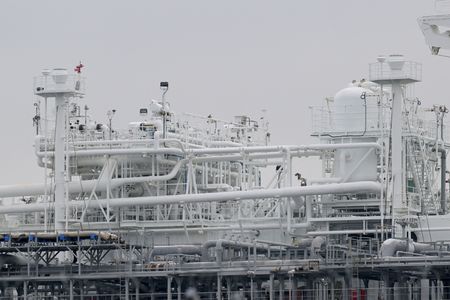By Mimosa Spencer
PARIS (Reuters) – LVMH lost its position on Tuesday as Europe’s largest luxury company in terms of market capitalization after being overtaken by rival Hermes due to investor pessimism after disappointing first-quarter revenue from the sector bellwether.
LVMH, whose high-end brands include Louis Vuitton and Dior, jewellery brand Tiffany & Co. and beauty chain Sephora, missed expectations for first-quarter sales as U.S. shoppers curbed purchases of beauty products and cognac while sales in China remained weak.
LVMH shares dropped 7%, bringing its market capitalization down to 246 billion euros, compared to 247 billion euros for Hermes.
While market valuations tend to fluctuate, Tuesday’s trading “does reflect diverging performance and investor sentiment about the two companies,” said Jelena Sokolova, senior equity analyst at Morningstar.
Sokolova pointed to LVMH’s larger exposure to the lower end of the luxury spectrum, whereas the wealthier client base of Hermes allowed it to better weather an industry downturn.
Hermes, which sells $10,000 Birkin and Kelly handbags, is known for its tight hold on production, sticking to a 6-7% increase each year.
The overtaking in market cap is “quite telling of the post, post-Covid world,” with LVMH fashion labels enjoying a far greater market share than in the past, having gained ground on rivals during the post-pandemic boom, noted Flavio Cereda, who manages GAM’s Luxury Brands investment strategy.
There will be “short term pain for sure” said Cereda, noting Vuitton’s focus more on middle-range luxury goods was an “the area of concern.”
LVMH, down 7.2%, led share declines across the sector, with Gucci-owner Kering and Hermes down 2% and 0.3% respectively. Swiss-based Richemont, which owns Cartier, was down 0.7% while Italy’s Prada was down 4.2%.
A 3% decline in LVMH’s first-quarter sales – well below analyst expectations for 2% growth, pointed to another difficult year for luxury companies following President Donald Trump’s recent tariff announcements, which have sparked fears of a recession.
The performance signaled “a more difficult trading environment for the broader luxury sector,” said RBC analyst Piral Dadhania, who lowered his organic sales forecast for LVMH this year to flat from growth of 3% expected previously, citing the first-quarter sales miss.
Investors had been hoping the luxury sector would pull out of its slump this year, but trade tensions have raised concerns of a global recession.
Improvement seen at the end of 2024 now seems an anomaly as LVMH’s key fashion and leather goods business, home to the Louis Vuitton and Dior brands, reverted to 5% sales declines, noted Deutsche Bank.
Shares of luxury companies have traded lower since the end of March, with LVMH, Kering and Burberry all down 14%, Richemont down 13% and Hermes down 5%.
Bernstein analysts recently lowered their sales forecast for the sector this year to a decline of 2%, against a previous forecast for 5% growth, a drop that would mark the industry’s longest downturn in over two decades.
(Reporting by Mimosa Spencer and Tassilo Hummel, additional reporting by Alun John in London; Editing by Sudip Kar-Gupta and Bernadette Baum)










